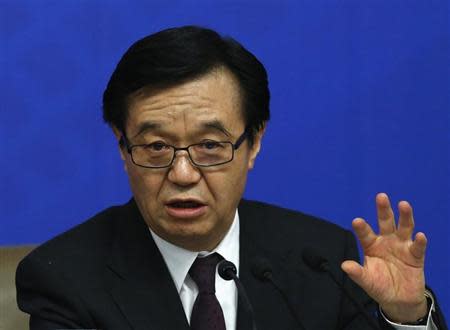EU, China end wine dispute ahead of Xi's European tour
By Ben Blanchard and Francesco Guarascio BEIJING/BRUSSELS (Reuters) - China and the European Union have reached a deal to end a dispute over European wine exports to China, the latest sign of improving ties and just days before China's president visits Europe. Beijing opened an inquiry last year into whether Europe was selling wine in China at unfairly low prices. The move was widely seen in Europe as retaliation over EU efforts to hit Chinese solar panels with punitive import duties. The solar panels dispute was resolved, but China had pressed ahead with the wine case, saying it was a separate issue despite European expectations that the inquiry would also be dropped. Paris was especially eager to see the probe called off. It remained an obstacle in trade relations between the two countries before next week's visit by Chinese President Xi Jinping to the French capital as part of a European tour. Chinese Commerce Minister Gao Hucheng on Friday welcomed the deal, which both sides hope will set a precedent in bilateral relations after the solar-panel spat last year. "Since the resolution last year of the China-EU solar panel dispute via dialogue and consultation, China and Europe had been on the correct track to dealing with trade friction," Gao said. The agreement was reached by involving Chinese and European wine producers, with support from Brussels and Beijing, EU Agriculture Commissioner Dacian Ciolos said. Under the terms of the deal, European producers have committed to providing technical assistance to help develop the Chinese wine industry. In return, Chinese buyers will promote European wine more widely in China. France, the world's biggest wine producer by value, has in the past called China's decision to consider duties on French wine "inappropriate and reprehensible". EU wine exports to China excluding Hong Kong, which EU officials say was not covered by the investigation, reached 257 million liters in 2012, with a value of nearly $1 billion. More than half came from France. The EU is China's most important trading partner and China is second only to the United States for Europe in terms of trade. But growing Chinese export volumes have raised concerns in the EU, which is struggling to overcome a debt crisis, about the impact on its industries. TELECOMS ROW REMAINS China and Europe also resolved another dispute this week, when Germany's Wacker Chemie said Chinese authorities had agreed to refrain from charging the company anti-dumping tariffs on polysilicon, which is used in making solar panels. Of the remaining big disputes between China and the European Union, only one over telecoms remains. The European Commission has threatened to open an investigation into accusations of unfair pricing by China's Huawei, the world's number two telecoms equipment manufacturer, and ZTE, the world's fifth largest. European manufacturers Ericsson, Nokia Siemens and Alcatel-Lucent have told EU officials they have suffered as a result of cheap Chinese imports of telecoms gear, although they are not prepared to make a formal complaint for fear of reprisals in China. Huawei and ZTE deny breaking any rules and both EU Trade Commissioner Karel De Gucht and China's Gao have signaled that the dispute could also be resolved soon, although they have declined to give details. China's decision to award billions of dollars in contracts to the three European companies to supply equipment for mobile networks is thought to have gone some way to easing tensions. China is now the world's largest market for mobile data services and smartphones, and its market is growing more than 50 percent a year, according to Alcatel-Lucent. (Additional reporting by Robin Emmott in Brussels; Editing by Larry King)



